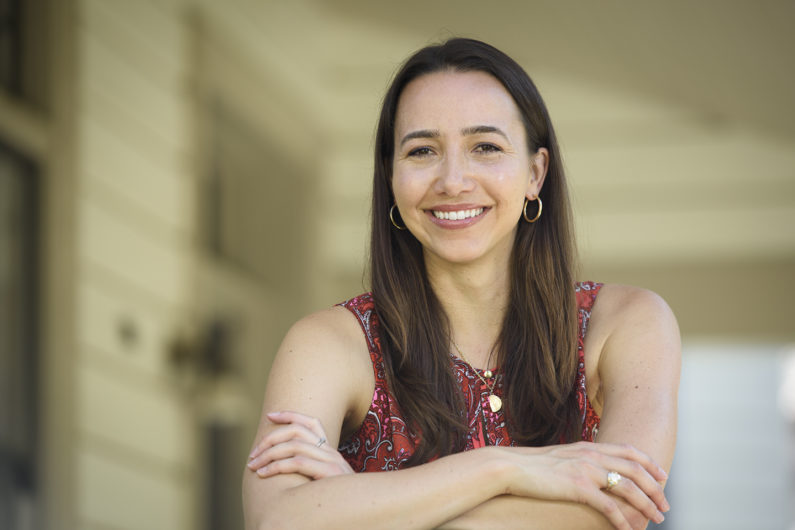New students to attend ‘Beyond Sex Ed: Consent & Sexuality at Stanford’ program
The new program aims to start an engaging conversation around sexuality, relationships, intimacy, consent and community at Stanford.
This week, Stanford will launch an innovative program designed to support new undergraduate students navigating the complex territory of sexuality, and establish a campus culture that promotes healthy, empowered and consensual relationships.

Brianna Booth, director of positive sexuality, design and development in the SARA office, says the new ‘Beyond Sex Ed’ program is designed to engage students in practicing communication skills related to boundaries, consent, sexuality and relationships. (Image credit: L.A. Cicero)
First-year and transfer students are required to attend the program, “Beyond Sex Ed: Consent & Sexuality at Stanford.”
The new program is one of several educational initiatives designed to engage incoming Stanford students in conversations about the need for affirmative consent, the reality of sexual violence on campus and the collection of resources available to all students.
Brianna Booth, director of positive sexuality, design and development in Stanford’s Office of Sexual Assault & Relationship Abuse Education & Response (SARA), has been developing Beyond Sex Ed over the last year, in collaboration with campus partners and students. She will lead the 90-minute program, which will be repeated on three consecutive evenings to accommodate all of the 1,781 first-year and transfer students.
The program will feature personal stories from current students, supported by an overview framework for thinking about sexuality experientially and culturally, as well as pair-share discussions and a mindfulness skill-building exercise.
Beyond Sex Ed aims to fill a cultural void by creating a thoughtful space to learn about, discuss and share stories of sexuality, reflecting students’ experiences as well as the surrounding systems of culture that influence those experiences. The program’s underlying philosophy is to engage the culture from the inside-out: recognizing sexuality as part of our humanity and hearing diverse stories from within the community.
Booth said sexuality is one of the most vibrant and vulnerable parts of being human, and no one comes to the topic “neutral.”
“We come from different families and different communities,” she said. “We’ve been taught different things about sexuality, and we believe different things. Most importantly, we’ve had different life experiences. All of those factors shape how we come to this topic. We want to acknowledge that at the outset of the program, and invite everyone into a conversation.”
Booth said Beyond Sex Ed will show students that sexuality encompasses more than sex and sexual orientation, and will give them a framework for better understanding and articulating the various aspects.
“We want students to have an appreciation for sexuality as a constellation of things – intimacy, sensuality, agency, sexual identity, and sexual health and reproduction – that make up this dimension of what we are as human beings,” she said. “Connecting to our sexuality is part of our humanity. To have a constructive conversation, we need to know what we’re talking about.”
Booth said Beyond Sex Ed is designed to engage students in thoughtful discussions and to practice communication skills related to boundaries, consent, sexuality and relationships. There is particular emphasis on understanding agency – what we choose to do with our sexuality – and its relationship to consent.
“A big part of the program is for me to ask a lot of questions – skillfully – to allow students to connect with their own experiences and to open up dialogue with each other as they navigate this space together,” she said. “I think the ideas we present, along with the student stories they hear, will inspire students to engage this topic in a way they haven’t before.”
Booth said the program will feature a mindfulness exercise to show students the power of tuning into one’s body and feelings, and then turning that same quality of attention on another.
During the program, 12 Stanford students will tell personal stories related to the program’s themes.
In recent months, Michelle Darby, lecturer in StoryCraft, a course offered through the Department of Theater and Performance Studies and the Stanford Storytelling Project, has been coaching the students, helping them hone and develop their stories, as well as preparing them to perform those stories on a stage.
Beyond Sex Ed was initiated by Erika Lynn Kreeger, a Stanford senior who won approval for the program proposal from Provost John Etchemendy and Harry J. Elam Jr., vice provost for undergraduate education. Kreeger made the call for students to share their stories. Eva Jordan, a resident fellow at Junipero, a first-year dorm, created custom art for the program. Marta Hanson, ’11, assistant dean/associate director of the Stanford Women’s Community Center, has also contributed to the program through her work with the students.
At the start of the program, Booth will encourage students to pay attention to their emotional reactions to the topics and issues presented, and if an urgent issue arises to seek support from the counselors who will be available onsite. Students will have discussions in their dorms following the program, facilitated by their RAs.
Beyond Sex Ed is one of several educational programs developed for new students. Among them:
- During autumn quarter, Stanford undergraduates trained as peer educators will lead workshops designed to introduce first-year students to the intrapersonal and interpersonal skills needed to cultivate a more resilient, supportive and safe Stanford community. The workshops, which will be held in dorms, are part of the new “SAVE: Stanford Anti-Violence Educators” program, a sexuality, consent and interpersonal violence prevention program that SARA launched last spring.
- Before they arrived on campus, all incoming students were required to take Haven: Understanding Sexual Assault, an online education course intended to help them learn more about sexual and relationship violence prevention, and their role in creating and maintaining a more respectful campus culture.
- During New Student Orientation, all incoming students attended “The Real World: Stanford,” a program that addressed situations they might encounter at college around well-being, health and safety.
